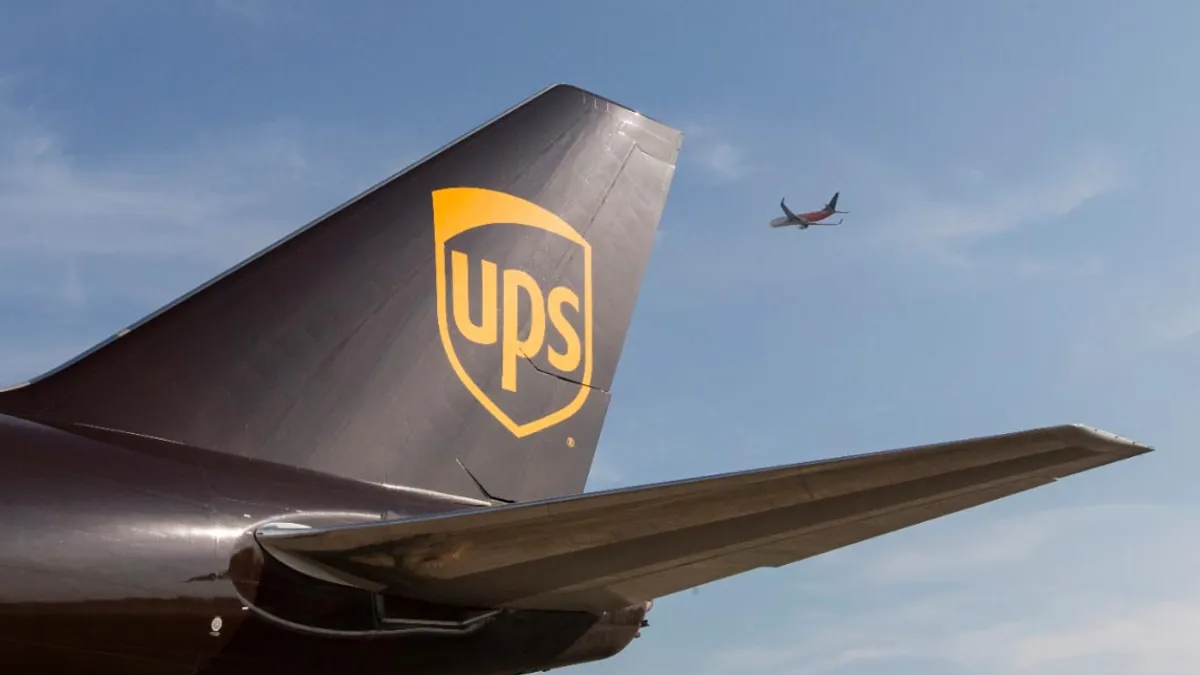Dive Brief:
- UPS will reduce the peak surcharge on air shipments from mainland China to the U.S., according to a notice on UPS' website. The lower surcharge amount takes effect Sunday and remains in place until further notice.
- The reductions range from 22 cents per pound to 45 cents per pound as outlined in the table below. UPS implemented surcharges on shipments from China and Hong Kong starting April 5, citing "increased demand for air cargo capacity and the increased costs to maintain service during this period" in a March 20 announcement. It increased the surcharge April 12 and again May 24.
- The surcharge on international shipments from all other origins, including Hong Kong, will stay the same. Peak surcharges on domestic shipments through Ground Residential and SurePost also remain in effect.
UPS peak surcharges per pound from mainland China to U.S.
| Service | April 5 to April 11 | April 12 to May 23 | May 24 to June 27 | June 28 until further notice |
|---|---|---|---|---|
| UPS Worldwide Express Plus | $0.34 | $0.45 | $0.79 | $0.57 |
| UPS Worldwide Express | $0.34 | $0.45 | $0.79 | $0.57 |
| UPS Worldwide Saver | $0.34 | $0.45 | $0.79 | $0.57 |
| UPS Worldwide Expedited | $0.29 | $0.41 | $0.75 | $0.52 |
| UPS Worldwide Express Freight | $1.13 | $1.25 | $1.81 | $1.36 |
| UPS Worldwide Express Freight Midday | $1.13 | $1.25 | $1.81 | $1.36 |
Source: UPS
Dive Insight:
UPS incrementally raised surcharges as airfreight rates ascended. However, its peak surcharge reduction coincides with a gradual calming of airfreight demand and rates. This week, airfreight rates fell to $4.98 per kilogram, less than half the rate during mid-May's peak and roughly in line with mid-March rates, according to the TAC Index.
The surcharge from Sunday onwards offers some financial relief to air shippers but is still higher than the first surcharge announced in March.
UPS said peak surcharges are subject to change and advised shippers to check the carrier's website before tendering shipments.
Parcel carriers witnessed surges in demand for international freight shipments in the early days of the pandemic. Passenger airlines canceled flights and made belly cargo capacity unavailable for shippers, leaving freighters to fill the gaps.
Importers also rushed to bring personal protective equipment (PPE) into the U.S. — a product that normally ships by ocean but shifted to air due to urgent need.
Now, many areas of the U.S. have built up inventories of PPE, Maayan Citron, the head of corporate marketing at Freightos, told Supply Chain Dive this week. The Federal Emergency Management Agency (FEMA) said the PPE supply chain is stabilizing, and it will wind down Project Airbridge at the end of the month. The project coordinated cargo flights to transport medical supplies from Asia to the U.S.
Importers continue to bring in PPE but by container ship. "Air and ocean rates have reversed roles," Freightos wrote in its weekly update. Ocean freight rates are climbing as airfreight rates continue to fall.













